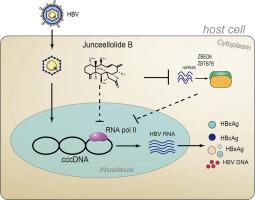Bioorganic & Medicinal Chemistry ( IF 3.3 ) Pub Date : 2020-06-25 , DOI: 10.1016/j.bmc.2020.115603 Xiaodan Li 1 , Hui Liu 2 , Wei Cheng 1 , Jie Wang 2 , He Zhang 1 , Fengmin Lu 3 , Xiangmei Chen 2 , Wenhan Lin 4

|
HBV infection is a common cause of liver disease with a high burden worldwide. Current therapeutic strategy relies on interferon and nucleos(t)ide-type drugs with the limitation of functional cure. In this study, a structure-based screening of marine natural products from an in-house library was performed to hit HBV inhibitors, and the gorgonian-derived briarane-type diterpenoids showed inhibitory effects against HBV DNA replication in HepAD38 cells. Preliminary analyses of structure–activity relationship demonstrated that a briarane-based scaffold with an 3E,5(16)-diene and a chlorine-substitution at C-6 is required for the anti-HBV activity. Junceellolide B is one of the potent HBV inhibitors exhibiting efficient reduction of HBsAg and HBeAg production in HBV infected HepG2-NTCP cells with a dose-dependent manner (p < 0.001). It also significantly reduced the secreted HBV DNA, HBV RNA, and HBeAg in HepAD38 cells with the EC50 values of 0.83, 2.87 and 7.75 μM, respectively. Mechanistically, junceellolide B potently inhibited HBV RNA transcription without promoting HBV RNA degradation. RNA-seq analysis indicated that junceellolide B significantly decreased HBV cccDNA-transcripted products accompanying stable down-regulation of the expression of RNA polymerase II related host transcription factors (ZBED6 and ZBTB7B). These findings suggest junceellolide B to be a transcription inhibitor of cccDNA and a promising lead for the development of new anti-HBV agent.
中文翻译:

Junceellolide B,一种新型的乙型肝炎病毒抑制剂。
HBV感染是肝脏疾病的常见病因,在世界范围内负担沉重。当前的治疗策略依赖于干扰素和核苷酸(t)化物型药物,但功能性治疗受到限制。在这项研究中,从内部库中对海洋天然产物进行了基于结构的筛选,以检测出HBV抑制剂,而源自戈尔贡人的briarane型双萜类化合物则显示出对HepAD38细胞中HBV DNA复制的抑制作用。初步的结构-活性关系分析表明,以3的E为基础的基于芳烃的支架抗-HBV活性需要在C-6处具有5,16(16)-二烯和氯取代基。芥子醇内酯B是有效的HBV抑制剂之一,在HBV感染的HepG2-NTCP细胞中表现出有效降低HBsAg和HBeAg产生的剂量依赖性(p <0.001)。还可通过EC 50显着减少HepAD38细胞中分泌的HBV DNA,HBV RNA和HBeAg值分别为0.83、2.87和7.75μM。从机理上讲,芥子内酯B有效地抑制了HBV RNA的转录而没有促进HBV RNA的降解。RNA-seq分析表明,芥菜内酯B可显着降低HBV cccDNA转录产物,并伴随RNA聚合酶II相关宿主转录因子(ZBED6和ZBTB7B)表达的稳定下调。这些发现表明,芥子素内酯B是cccDNA的转录抑制剂,是开发新型抗HBV药物的有希望的先导。










































 京公网安备 11010802027423号
京公网安备 11010802027423号